Browse
Education
Call for submissions: Faith, Religion and Global Higher Education
Special Issue Information
Dear Colleagues,
The history of higher education in both Western and non-Western cultures finds direct roots in religion—from Buddhist monasteries in ancient India to Islamic madrasas in the Arab region, and to Christian seminaries in Europe and the colonial US. Through a process of secularization of the state apparatuses and their major educational institutions in the post-Industrial Revolution Europe and their colonies, most colleges and universities today are secular. Still, an estimated 2000 religious higher education institutions operate worldwide, and evidence suggests that the numbers are expanding. For example, sub-Saharan Africa has seen the largest growth in private higher education institutions with religious affiliations in recent times (Karram 2011 citing Thayer 2003).
A primary contemporary research interest reflects a recognition and avenues for further exploration that religious beliefs and praxis play significant roles in re-imagining the higher education spheres at individual and institutional levels. In the last few decades, scholars have argued that there is a “return” of religion in higher education (Jacobsen and Jacobsen 2012). Studies suggest that there is a higher level of interest in spirituality among US undergraduate students. Student-led religious organizations and places of worship have increased in college campuses. There has been a “resurgence” of studying religion in American colleges and universities (Hill 2009). In addition, there is an increasing number of proponents for “holistic student development” among student affairs scholars who argue that students’ spiritual growth is equally important (Mayrl and Oeur 2009). Some scholars go as far as naming the current higher education epoch as a “post-secular” campus (Jacobsen and Jacobsen 2012; Sommerville 2006).
While there is a growth in interest among scholars to understand how religion intersects with the academic lives of students, there is also room to explore whether and how religious higher education institutions influence and (re)produce knowledge, what the challenges faced by these institutions are, and how they envision the ways forward—particularly in the post-COVID-19 pandemic reimagination and reformation of the world. Simultaneously, both secular and religious universities and colleges grapple with continuous debates over academic freedom and autonomy, freedom of speech, gender identities, equality issues, radicalization, university governance and finances, and negotiation with state and other broader communities. A further area to explore is higher-level education focused on future religious leaders. Finally, given the interest in religious literacy across a wide spectrum of professions, continuous adult learning focused on related issues is worth exploration.
This Special Issue aims to speak to these current debates and go beyond them, particularly from a global perspective, by featuring empirical research papers, reviews of research studies, theoretical/conceptual discussions, and technical reports. The broad goals of the Special Issue are to explore whether and how religion is an important factor in higher education student affairs, how to (re)conceptualize religion and the ways in which it is negotiated at the institutional levels with other pervasive factors such as globalization, and to highlight interventions as well as innovations in both knowledge (re)production and dissemination—all from an international and comparative education perspective.
Dr. Katherine MarshallDr. Sudipta RoyGuest Editors
Manuscript Submission Information
Manuscripts should be submitted online at www.mdpi.com by registering and logging in to this website. Once you are registered, click here to go to the submission form. Manuscripts can be submitted until the deadline. All papers will be peer-reviewed. Accepted papers will be published continuously in the journal (as soon as accepted) and will be listed together on the special issue website. Research articles, review articles as well as short communications are invited. For planned papers, a title and short abstract (about 100 words) can be sent to the Editorial Office for announcement on this website.
Submitted manuscripts should not have been published previously, nor be under consideration for publication elsewhere (except conference proceedings papers). All manuscripts are thoroughly refereed through a double-blind peer-review process. A guide for authors and other relevant information for submission of manuscripts is available on the Instructions for Authors page. Religions is an international peer-reviewed open access monthly journal published by MDPI.
Please visit the Instructions for Authors page before submitting a manuscript. The Article Processing Charge (APC) for publication in this open access journal is 1200 CHF (Swiss Francs). Submitted papers should be well formatted and use good English. Authors may use MDPI's English editing service prior to publication or during author revisions.
Click here to learn more!
By:
Elaina Lawrence
Monday, Aug 16, 2021
EDUCATION
No Preview Available
Leave a comment
Advisory Board member publication on technology in Africa's Higher Education
AAP Advisory Board member, Paul Zeleza who is Vice Chancellor and Professor at the United States International University- Africa, has recently co-authored a piece published by The Elephant.
Within the report, Zeleza and Paul Mzee Okanda provide a detailed analysis of technological opportunities in Africa’s higher education which were unveiled by covid-19. They argue that investment in High Performance Computing platforms is essential for the development of solutions to societal, scientific, and industrial challenges in Africa.
“We invite you to join African universities in this great calling and journey to transform higher education on this continent to educate, skill, and empower the youth to fully participate in their countries’ socioeconomic development. At stake is not only their future, but the future of the African continent and humanity itself, as much of this humanity becomes increasingly African.”
https://www.theelephant.info/long-reads/2021/02/09/enhancing-the-digital-transformation-of-african-universities-covid-19-as-accelerator/
By:
Madeleine Futter
Monday, Aug 16, 2021
EDUCATION

No Preview Available
Leave a comment
9 PhD Scholarships Available with Animal Health Innovation Lab
The Animal Health Innovation Lab in partnership with the University of Nairobi is offering 9 PhD scholarships. The fully funded positions, offered by USAID, will develop research and lab-based solutions to the East Coast Fever. In Kenya and East Africa, this tick-borne disease of cattle has created constraints to human nutrition and economic welfare. The multi-institutional and multi-disciplinary environment offers a unique opportunity for those seeking a PhD in a main research project at the Animal Health Innovation Lab.
The application deadline is Feb. 10, 2021 at 23:59pm. Review the link and photo to apply!
https://uonbi.ac.ke/news/feed-future-animal-health-innovation-lab-phd-scholarships
By:
Madeleine Futter
Monday, Aug 16, 2021
AGRI-FOOD SYSTEMS
+2

Leave a comment
Journal of Slavery and Data Preservation Publication
We are excited to announce the publication of Issue 2 of the Journal of Slavery and Data Preservation. On behalf of the entire team at Enslaved.org, we commend an impressive slate of contributors for joining us in a novel endeavor at the intersection of historical studies, anti-racism, and peer-reviewed, digital scholarly publication. We are looking to garner attention to this collection of rich data articles and could use your help! The data articles included in this Issue are:
Legacies of British Slave-ownership, 1760-1880 Keith McClelland
Database of Coroners’ Inquisitions Taken Over the Bodies of Enslaved, Formerly Enslaved, and Free Black Peoples in the U.S. South, 1840s-1890s Stephen Berry
Take Them in Families: The Enslaved People of Casa Bianca Plantation, Florida Miranda R. W. Burnett & Martin H. Violette
Contested Freedom: Free Persons of Color in Savannah, GA, 1823-1842 Marquis Taylor
Enslaved People in the African American National Biography, 1508-1865 Steven J. Niven
They Had Names: Representations of the Enslaved in Liberty County, Georgia, Estate Inventories, 1762-1865 Stacy Ashmore Cole
An Editors’ Introduction describes these databases according to FAIR Guiding Principles for Scientific Data Management and Stewardship.
#EnslavedOrg #JSDP
By:
Elaina Lawrence
Monday, Aug 16, 2021
EDUCATION
No Preview Available
Leave a comment
Call for Papers for the 22nd International Conference on Knowledge, Culture, &Change in Organization
We are pleased to share with you the Call for Papers for the Twenty-second International Conference on Knowledge, Culture, and Change in Organizations, The University of Auckland, Auckland, New Zealand,14–15 January 2022.The Organization Studies Research Network comes together around a common concern for, and a shared interest to explore, new possibilities in knowledge, culture and change management, within the broader context of the nature and future of organizations and their impact on society. We seek to build an epistemic community where we can make linkages across disciplinary geographic and cultural boundaries. As a Research Network we are defined by our scope and concerns and motivated to build strategies for action framed by our shared themes and tensions.The Twenty-second International Conference on Knowledge, Culture, and Change in Organizations features research addressing the following annual themes and special focus:
2022 Special Focus: Rethinking Organizational Resilience
Reimagining the Scholarly Conference
Our mission is to provide a safe, sustainable, and accessible way for us to come together and interact as a Research Network. We are taking on these challenges by offering a blended conference experience, with session types explicitly designed to make the most of both online and place-based social knowledge processes. We are trying to move away from the either/or of place-based or online conferences.
We are moving to bring conference presentations into the digital era. All presenters, in-person or online, will be given personal Presenter Pages:
Linked to your profile page on CGScholar.com
Displaying abstract summary
Thematic connection to panelists and peers
Ability to add digital media: video, sound, other files.
You do not need to commit either to a place-based or virtual presentation at the time of submission. You can present both ways, or change your mode of the presentation if your preferences change.And all content will be displayed online.This way we build for our Research Network Members flexible, and at the same time resilient, spaces for communication, engagement, and participation.
Become a Presenter
Benefits of an Audience Pass
Important Dates
We welcome the submission of proposals at any time of the year. All proposals will be reviewed within two to four weeks of submission. Again, you do not need to commit either to a place-based or online presentation at the time of submission. You can present both ways, or change your mode of the presentation if your preferences change.
Proposal & Registration Dates
Proposal Deadlines
Advance
14 Mar 2021
Early
14 June 2021
Registration Deadlines
Advance
14 Apr 2021
Early
14 July 2021
Submit a proposal by 14 February 2021*
Submit Your Proposal Today
By:
Elaina Lawrence
Monday, Aug 16, 2021
EDUCATION
No Preview Available
Leave a comment
HU Symposium on US Africa Policy - February 19
Tune in on February 19 to this virtual symposium on Reshaping US Africa Policy and the Role of HBCUs!
There will be an excellent line-up of speakers for this important and timely event. About 16 prominent African American scholars, activists and diplomats have been invited to present around four broad themes: Critical Assessment of US-Africa Policy in the post-Cold War era: Lessons Learned from African American Engagement: Building Back Better a more diverse and representative Diplomatic Corps: Strategies for Engaging Africa’s Development. This symposium seeks to draw on lessons of past African American policy engagement as well as present tangible strategies to mobilize an African American constituency for Africa and partner with HBCUs in rebuilding U.S. diplomacy and our diplomatic corps.
Use the link below to learn more and register:
https://cfas.howard.edu/Symposium-US-Africa-HBCUs
By:
Elaina Lawrence
Monday, Aug 16, 2021
EDUCATION
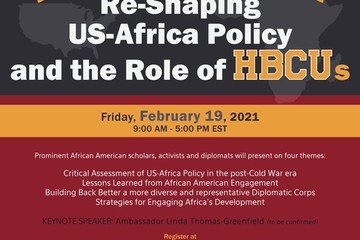
Leave a comment
Africa Food Prize 2021 nominations now open
Click this link to learn more
By:
Elaina Lawrence
Monday, Aug 16, 2021
EDUCATION
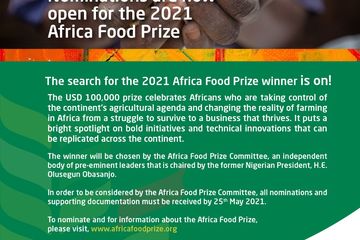
Leave a comment
Call for Papers
We are pleased to share with you the Call for Papers for the Eleventh International Conference on The Constructed Environment, University of Calgary, Calgary, Canada, 12–14 May 2021.The Constructed Environment Research Network is brought together by a common shared interest in human configurations of the environment and the interactions among the constructed, social and natural environments. We seek to build an epistemic community where we can make linkages across disciplinary, geographic, and cultural boundaries. As a Research Network, we are defined by our scope and concerns and motivated to build strategies for action framed by our shared themes and tensions.The Eleventh International Conference on the Constructed Environment features research addressing the following annual themes and special focus:
2021 Plenary Speakers
The International Conference on the Constructed Environment will feature plenary sessions by some of the world’s leading thinkers and innovators in the field.
Eliot TretterAssociate Professor, Department of Geography and the Urban Studies Program, University of Calgary, Canada
Leroy Little BearBlackfoot Researcher, Professor Emeritus, University of Lethbridge, Canada
Kelly ColesPMP, Director, Design & Construction, Calgary Municipal Land Corporation, Canada
Reimagining the Scholarly Conference
Our mission is to provide a safe, sustainable, and accessible way for us to come together and interact as a Research Network. We are taking on these challenges by offering a blended conference experience, with session types explicitly designed to make the most of both online and place-based social knowledge processes. We are trying to move away from the either/or of place-based or online conferences. And at the same time be ready for the possibility of place based cancelation due to COVID-19. This way we build for our Research Network Members resilient spaces for communication, engagement, and participation.
We are moving to bring conference presentations into the digital era. All presenters, in-person or online, will be given personal Presenter Pages:
Linked to your profile page on CGScholar.com
Displaying abstract summary
Thematic connection to panelists and peers
Ability to add digital media: video, sound, other files.
You do not need to commit either to a place-based or virtual presentation at the time of submission. You can present both ways, or change your mode of the presentation if your preferences change.And all content will be displayed online.This way we build for our Research Network Members flexible, and at the same time resilient, spaces for communication, engagement, and participation.
Become a Presenter
Benefits of an Audience Pass
Important Dates
We welcome the submission of proposals at any time of the year. All proposals will be reviewed within two to four weeks of submission. Again, you do not need to commit either to a place-based or online presentation at the time of submission. You can present both ways, or change your mode of the presentation if your preferences change.
Proposal & Registration Dates
Proposal Deadlines
Late
12 Apr 2021
Registration Deadlines
Regular
12 Apr 2021
Late
12 May 2021
Submit a proposal by 12 February 2021*
Submit Your Proposal Today
By:
Elaina Lawrence
Monday, Aug 16, 2021
EDUCATION
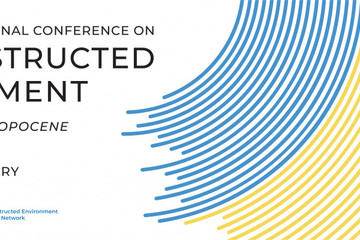
Leave a comment
CALL FOR PAPERS
We are pleased to share with you the Call for Papers for the Nineteenth International Conference on New Directions in the Humanities, Complutense University of Madrid, Madrid, Spain, 30 June - 2 July 2021.The New Directions in the Humanities Research Network is brought together by a common interest in established traditions in the humanities while at the same time developing innovative practices and setting a renewed agenda for their future. We seek to build an epistemic community where we can make linkages across disciplinary, geographic, and cultural boundaries. As a Research Network, we are defined by our scope and concerns and motivated to build strategies for action framed by our shared themes and tensions.
The Nineteenth International Conference on New Directions in the Humanities features research addressing the following annual themes and special focus:
2021 Plenary Speakers
The Nineteenth International Conference on New Directions in the Humanities will feature plenary sessions by some of the world’s leading thinkers and innovators in the field.
Reimagining the Scholarly Conference
Our mission is to provide a safe, sustainable, and accessible way for us to come together and interact as a Research Network. We are taking on these challenges by offering a blended conference experience, with session types explicitly designed to make the most of both online and place-based social knowledge processes. We are trying to move away from the either/or of place-based or online conferences. And at the same time be ready for the possibility of place based cancelation due to COVID-19. This way we build for our Research Network Members resilient spaces for communication, engagement, and participation.
Follow this link to learn more and submit your proposal.
By:
Elaina Lawrence
Monday, Aug 16, 2021
EDUCATION
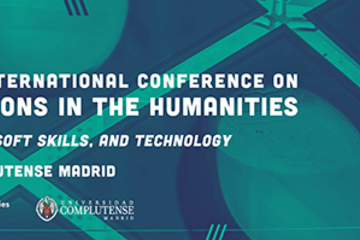
Leave a comment
Check out these rising stars! Michigan Fellows Agribusiness Initiative (MFAI)
Congratulations to the Michigan Fellows Agribusiness Initiative (MFAI) on receiving a Professional Fellows Program alumni award signifying your growth and continued success. We are delighted for the success of the 2nd Agribusiness Apprenticeship Program and can't wait to see how these young agribusiness professionals make their marks in Uganda and beyond.
A special thanks to St. Lawrence University for hosting the training, the US Department of State Bureau of Educational and Cultural Affairs for its financial support, and to MFAI’s ongoing partners: the Empowerment Initiative for Women and Youth, Uganda; the US Mission in Kampala; Kyambogo University; and, the Africa 2000 Network, Uganda!
https://www.newvision.co.ug/news/1536048/us-embassy-st-lawrence-university-partner-promote-agribusiness
By:
Elaina Lawrence
Monday, Aug 16, 2021
EDUCATION
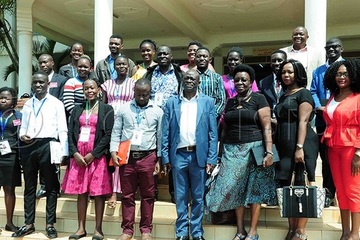
Leave a comment
CFP: History in Africa 2022 "New Interdisciplinary Approaches to African History"
History in Africa is seeking contributions that examine interdisciplinarity in African history in new ways. Interdisciplinarity happens across academia on multiple, overlapping levels including the use of methods from other disciplines, team-based collaborations (multidisciplinary), and the creation of new fields (transdisciplinary).
As historians of Africa, we may engage in interdisciplinary work by doing ethnographic research or by maintaining an appointment in a multidisciplinary African Studies program. Meanwhile, at many of our institutions, there are pressures to establish new interdisciplinary majors, often in STEM, but also in the humanities and social sciences. How does this proliferation of interdisciplinary programming relate to us as historians? In particular, the editors are interested in how scholars are rethinking interdisciplinary methods while engaging with source materials. As historians, we have generally taken for granted our capacity to engage in interdisciplinary work, especially by working with anthropology, linguistics, or even archaeology (Zeleza 2007; Brizuela Garcia 2008). Yet, as historians of Africa we also rely on literature, visual arts, and, increasingly, digital media, in our scholarship and teaching. Are there ways in which interdisciplinarity in African history is being redefined by changing methodologies, archival materials, or sources?
This CFP comes as the story of the post-World War II origins of African Studies and the role of scholars in a changing world faces new scrutiny. It is compelling that African Studies did not emerge on the scene in the 1950s as the story has often been told. Instead, African Studies began in the aftermath of the US Civil War as Black intellectuals and activists developed an interdisciplinary and pan-African outlook to their work that originally flourished at Historically Black Colleges and Universities. (James Pritchett, "Reflections on the State of African Studies," Presidential Lecture, ASA 2014, Indianapolis, IN) The theme of the 63rd ASA meeting that we just shared virtually called on us to recognize and confront these legacies of division and exclusion in African Studies. We must also respond to the range of twenty-first century movements calling for social justice on the African continent and in the Global North (Ampofo 2016). How do interdisciplinary frameworks provide different creative spaces to address these calls to action that also shape our work as historians of Africa?
We invite contributions that address interdisciplinarity in African history in relation to methods, source analysis, and historiographical debates.
As always, submissions that fall outside of the scope of this special section theme of interdisciplinary approaches are welcome.
We also invite submissions for other features in our journal including Archival Reports,“Interview with an Archivist,” and “History from Africa” on a rolling basis. Please address any questions to the Managing Editor.
Possible topics related to our interdisciplinary theme include:
Theorizing interdisciplinary methods
Promise and challenge of collaboration
Interdisciplinary methods and public histories
Redefining the discipline
Linking Africa and its diasporas
Interdisciplinarity and the digital humanities
Racial justice and interdisciplinarity
Centering Africa in interdisciplinary approaches
SUBMISSION INSTRUCTIONS
Please email a 500-word abstract to managingeditor@historyinafrica.org by February 15, 2021 with the subject line: HiA Abstract Submission 2022. By late February, authors will be notified whether to submit a full article for peer review by June 1, 2021. Please note that invitations to submit articles for peer review do not guarantee publication.
Articles selected for publication after peer review will be included in the 2022 volume of History in Africa. Articles may appear in advance of the publication date via FirstView once the copy editing process is completed. Any queries should be addressed to Lorelle Semley at managingeditor@historyinafrica.org.
Works Cited
Paul Tiyambe Zeleza, “Introduction: The Disciplining of Africa,” in Zeleza, ed., The Study of Africa: Disciplinary and Interdisciplinary Encounters, vol. 1 (CODESRIA: Dakar, 2007), 1-35.
Esperanza Brizuela-Garcia, “Towards a critical interdisciplinarity? African history and the reconstruction of universal narratives,” Rethinking History Vol. 12, No. 3, September 2008: 299–316.
James Pritchett, “Reflections on the State of African Studies,” Presidential Lecture, ASA 2014, Indianapolis, IN, https://www.youtube.com/watch?v=cYxbYLgx32M
Akosua Adomako Ampofo, “Re-Viewing Studies on Africa, #Black Lives Matter, and Envisioning the Future of African Studies,” African Studies Review, Vol. 59, No. 2 (September 2016): 7–29.
By:
Elaina Lawrence
Monday, Aug 16, 2021
EDUCATION
No Preview Available
Leave a comment
Webinar: Retrieving Women's Voices in African Political History 12/01/2020
Since the 1970s, scholars have raised awareness about the gender biases of archival sources, especially when it comes to colonial, postcolonial, national or diplomatic archives. They have shown that women’s invisibility did not mean an absence of traces, and advocated innovative methodologies and the search for unusual sources to reconstruct women’s lost voices in African history.
Our guest speakers work on African women's voices in various historical, geographical and more importantly political contexts, and with many different sources (public archives, literature, autobiographies...). They will share their insights on how to retrieve, create or re-interpret sources about women’s power and how to find new conceptual tools to complicate political narratives
Speakers: Anna Adima (Doctoral researcher, University of York), Marciana Nafula Were (Lecturer, Tom Mboya University/Stellenbosch University) & Immanuel Harisch (Doctoral researcher, Department of African Studies, University of Vienna).
The discussion will be informal (short presentation of archives/sources; Q&A). This working group doesn’t mean you have to work: just come join us to listen and/or contribute to a friendly discussion where students, researchers and professors are all welcome!
Registration to access the online meeting here: https://www.eventbrite.com.au/e/beyond-silences-retrieving-womens-voices-in-african-political-history-tickets-132949793411
By:
Elaina Lawrence
Monday, Aug 16, 2021
EDUCATION
No Preview Available

Leave a comment